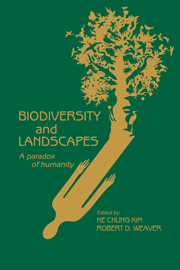Book contents
- Frontmatter
- Contents
- Contributors
- Preface
- Part I Introduction
- Part II Human values and biodiversity
- 2 Thoreau and Leopold on science and values
- 3 Creation: God and endangered species
- 4 Biodiversity and ecological justice
- Part III Human processes and biodiversity
- Part IV Management of biodiversity and landscapes
- Part V Socioeconomics of biodiversity
- Part VI Strategies for biodiversity conservation
- Part VII Biodiversity and landscapes: postscript
- Index
2 - Thoreau and Leopold on science and values
Published online by Cambridge University Press: 04 August 2010
- Frontmatter
- Contents
- Contributors
- Preface
- Part I Introduction
- Part II Human values and biodiversity
- 2 Thoreau and Leopold on science and values
- 3 Creation: God and endangered species
- 4 Biodiversity and ecological justice
- Part III Human processes and biodiversity
- Part IV Management of biodiversity and landscapes
- Part V Socioeconomics of biodiversity
- Part VI Strategies for biodiversity conservation
- Part VII Biodiversity and landscapes: postscript
- Index
Summary
When we ask, “What is the value of biodiversity?” we can expect that respondents, assuming that they answer the question at all, will answer in one of two quite different ways. Let us sketch these alternatives.
Some answers are mainly economic, emphasizing the actual and potential uses of living species. To this group, the value of biodiversity will be stated in quantifiable terms (Randall, 1988). This approach is utilitarian and anthropocentric. It measures value as contributions to human welfare. And it is “reductionistic” in the sense that it reduces to dollars all of the apparently disparate values and uses associated with wild species. Reductionists discuss the value of biodiversity by trying to put fair prices on its uses; they are most comfortable with the language of mainstream, neoclassical microeconomics. Natural objects, on this approach, are simply “resources” for human use and enjoyment. One characteristic of this approach, which makes it attractive in decision processes, is that it promises an aggregation of values: the contribution of nature to human welfare is made commensurable and interchangeable with other human benefits. This approach, therefore, holds open the possibility of a bottom-line figure that tells us what we should do in complex policy decisions; we should have exactly as much preservation of biodiversity as society is willing to pay for, given competing social needs.
- Type
- Chapter
- Information
- Biodiversity and LandscapesA Paradox of Humanity, pp. 31 - 46Publisher: Cambridge University PressPrint publication year: 1994
- 2
- Cited by



